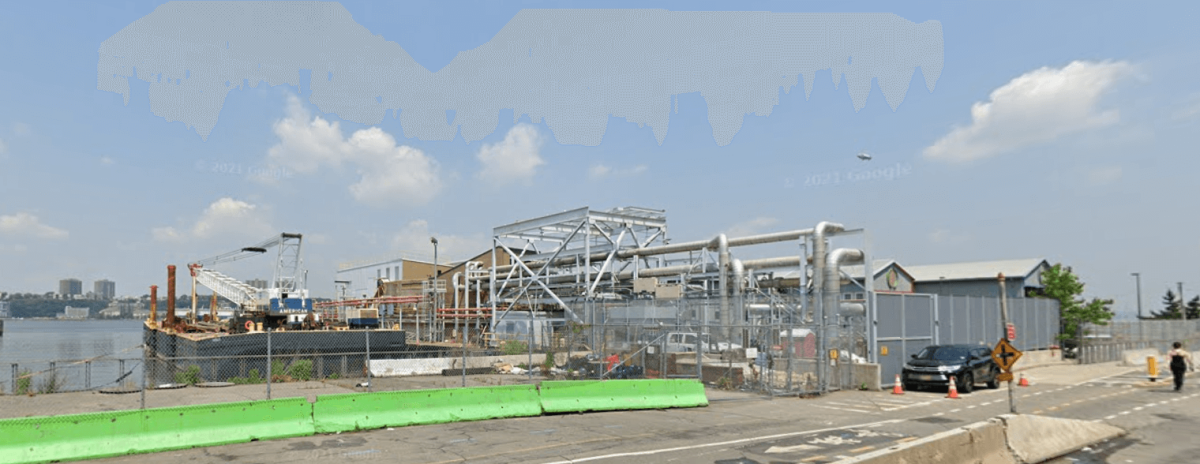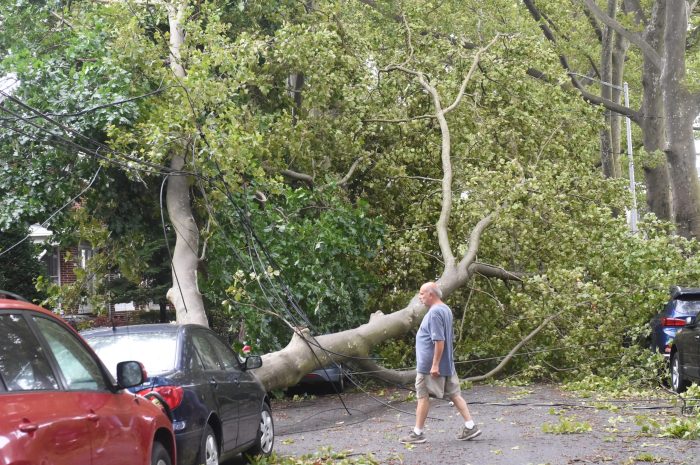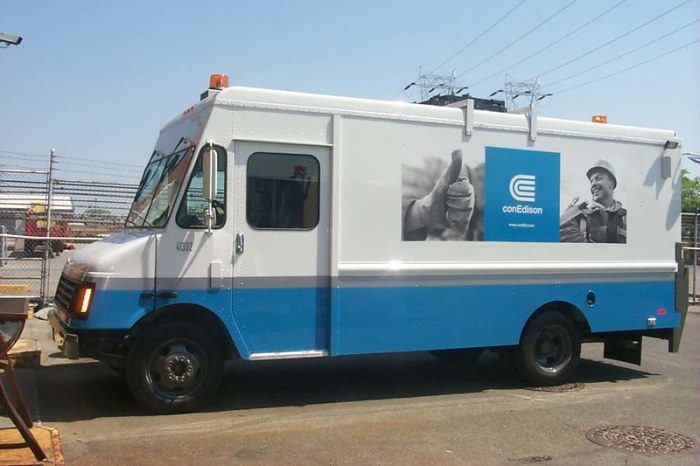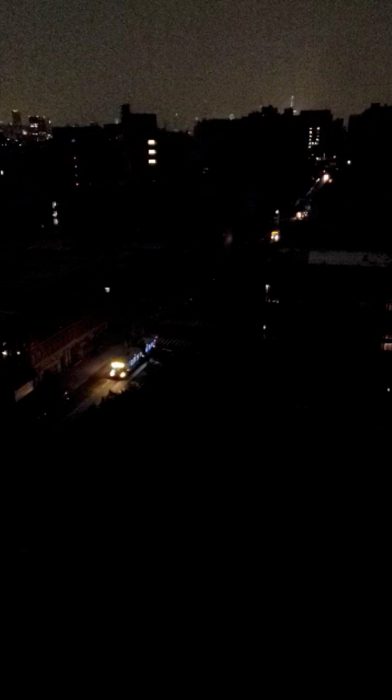A Con Edison facility that regularly discharges wastewater into the Hudson River in Midtown is operating within the limits of its environmental permits, the utility giant asserted at a Sept. 8 community board meeting.
“First of all, I want to be very clear that Con Edison has a valid permit for its operations at Pier 98, and operates in compliance with the permit,” said Venetia Lannon, Vice President for Environmental Health and Safety at Con Edison. “It’s only in very rare instances where discrepancies have occured, we’ve identified those discrepancies, we’ve reported them to the DEC, and the DEC has stated that they consider these instances ‘minor.’”
The company virtually visited Manhattan Community Board 4 to refute recent claims that it is violating its state water pollution permits by flushing hot, contaminated water into the river at Pier 98 in Hudson River Park. Equipment housed on the pier is used to pull water out of the river for use in cooling systems at the utility’s nearby 49th Street Substation, and two outflow points discharge that water — and water left over from operations at the 59th Street Steam Generating Plant — back into the river.
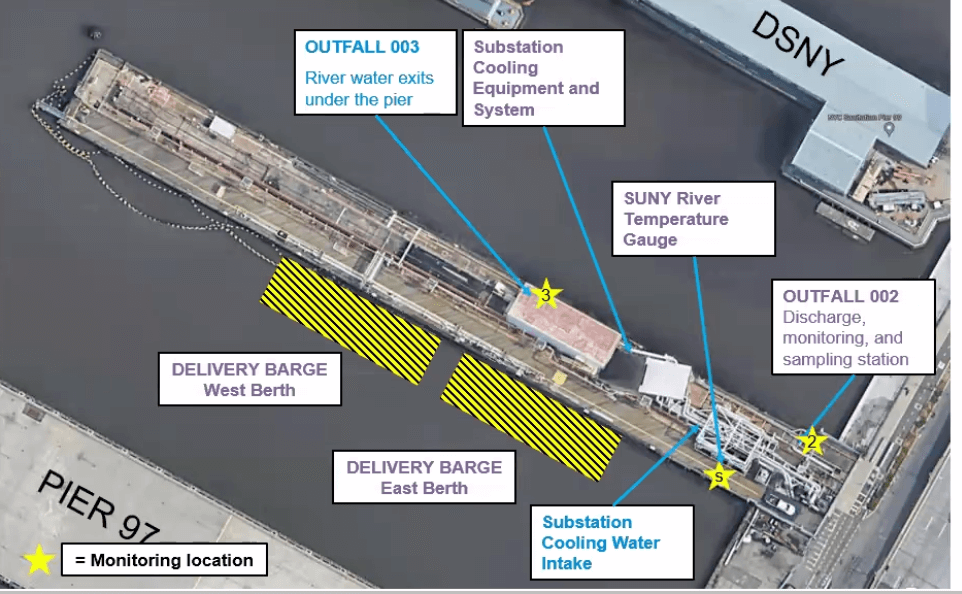
Con Edison has been using the cooling systems for about 20 years, according to permits issued by the state’s Department of Environmental Conservation, but members of the Hudson River Park Trust‘s advisory council told the New York Times last month they hadn’t been told exactly what Con Ed was doing, and believe the company is violating its permit and putting the river and the its wildlife at risk.
Advisory Council member Tom Fox threatened last month to sue Con Edison, the DEC, and the Trust for violating the federal Clean Water Act, according to the New York Times.
Con Edison has operated Pier 98 primarily to receive oil deliveries for its 59th Street Steam Station since 1959, and is currently leasing the pier from the Trust for a whopping $1.3 million per year.
Lannon said the water used in the 49th Street cooling systems does not come in direct contact with the equipment at any point, but is carried through the facility in carbon-steel pipes. According to monitoring equipment used by Con Edison, water is discharged into the river at 90 degrees Fahrenheit or less more than 99% of the time — and the average temperature of the discharged water is 78 degrees Fahrenheit. The temperature of the Hudson River fluctuates during the year — with highs up to 80 degrees in the late summer and lows in the 30s, according to data collected by the U.S. Geological Survey.
Water quality tests have detected low levels of chemicals like selenium, chromium, chloroform, copper and lead in the discharged water, Lannon said, but, for the most part, they are low enough to meet state standards considered safe for swimming. The only chemical found at a level that violated those standards was copper – which Lannon said may have been present in the river water when it was taken in.
“Copper is something that occurs in lakes and rivers throughout New York State — things like manganese, iron, copper are very common in water supplies,” she said. “So it could be that it’s coming from the river itself, we don’t know. But the point is, it’s also at very trace levels, it just wouldn’t meet those highest water quality standards.”
There have been 26 violations of permit standards at Pier 98 since 2010, according to the DEC. They include violations of pH balance standards, high levels of “suspended solids,” and a number of “flow discrepancy events,” where samples were not taken.
State and federal data show 12 violations in the last five years — most are related to Con Edison failing to take or report required samples. Those violations occurred largely because the DEC orders scheduled samples, and the cooling system only operates for about 25-30% of the year, Lannon said. If a sample is scheduled for a day when there is no discharge, it can be logged as a violation.
“I don’t want to minimize the administrative fouls, as I’m calling them, they’re important and we’re seeking to improve our performance always,” she said. “But in terms of impact to the river, this is a molehill.”
DEC considers those incidents “minor and quickly resolved,” Lannon said.
The second outflow discharges water left over from the process of making steam at the 59th Street Steam Generating Plant, said Frank Cuomo, general manager of steam services at Con Edison.
That plant produces FDA-quality steam that is used to heat homes and businesses and to sterilize medical and food equipment at nearby hospitals and other businesses, Cuomo explained. It is one of Con Ed’s smaller steam generating plants, and, like the cooling systems, is only operational for a few months out of the year — usually in the winter months.
Steam production starts with city drinking water, Cuomo said, which is boiled and filters to remove minerals that could be harmful to equipment.
“The minerals that are pulled out of the process need to be collected,” he said. “They go into our pH balancing and monitoring systems. They are balanced to make sure that before the water is discharged in the outfall, that it falls within the parameters we have set at our station.”
Finally, Lannon addressed accusations that the facility’s permits are expired.Its State Pollutant Discharge Elimination Systems technically expired in 2019, but Con Ed applied for a renewal in 2016, she said. In 2019, they asked to modify the permit to accommodate changes to some of their systems.
The modification kicked off an entirely new technical analysis by DEC, and a new permit cannot be granted until that is complete — so the department has extended their existing permit, Lannon said.
“The process change is about significant upgrades to our water treatment systems at all stations, not just 59th Street, but that process change does affect the permit renewal,” Cuomo said.
Those upgrades have already been completed and are in place, despite the fact that DEC has not finished their review. Selvin Southwell, a regional water engineer at the DEC, said Con Ed and the DEC were in constant contact throughout the installation.
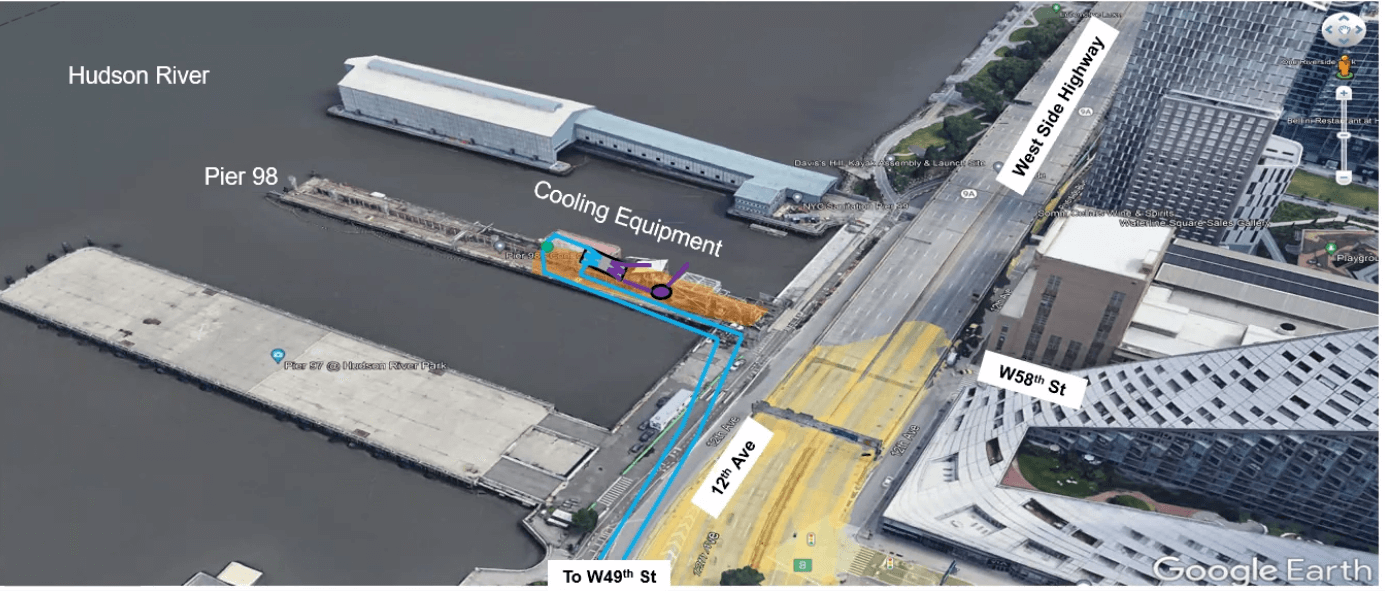
“We’re not going to make the fact that the permit is not yet modified stand in the way of improved effluent quality into the Hudson River,” he said. “They work with us from day one, from the inception of the idea, so none of these things come as a surprise to us.”
The modified permit should be available for public review within the next several months, Southwell said.
Fox, the advisory council member who threatened to sue for violations of the Clean Water Act, said he and the City Club have not heard back from Con Ed since they sent the letter threatening legal action last month, and questioned the legality of their permit extension.
“I’m not here to condemn or castigate anyone, I’m just here to see the best possible outcomes for the Hudson River,” he said. “Speaking for the fish, so to speak. They don’t have a very loud voice.”
Fox further said he felt Con Ed and the Trust had not been transparent enough about the company’s operations when they negotiated the lease, and that the meeting had provided “some clarification, but not sufficient to my liking.”
“I look forward to the opportunity to speak technically with your folks and our Army Corps of Engineers and legal folks and hopefully avoid litigation because, in absence of hearing what we need to hear, that’s the route we’re going to be going, unfortunately,” he said.
Correction Sept. 12, 2022, 12:45pm: This story previously misstated Tom Fox’s position with the Hudson River Park Trust. Fox is a member of the Advisory Council, not of the Trust itself.



